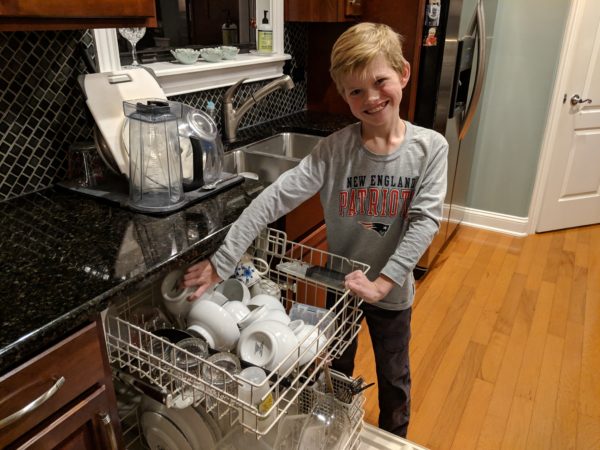
Some of my closest friends and family disagree with me on this, but we are NOT paying our child an allowance. At least, we don’t plan to for the near future — he’s only 9. Possibly never, until he gets a job at 16 and can pay himself. Even then, he may need a car to get to his job, which he’ll partly pay for (IF he even gets one) with said job paycheck. I grew up in the ’70s and ’80s and can now appreciate the times in which I was raised and how hard my parents worked to instill responsibility, accountability, and gratitude in me. I hated how strict they were with me at the time (trust me, stricter than most of your parents), and I never received an allowance. Now as a parent myself, I appreciate their methods.
I hear you already, Mamas, I hear you through your screens saying allowances are good tools to teach kids about finances! It’s a great incentive to do chores and make good grades! It gives them the independence to buy their own toys and games without always having to ask you for money! Allowances are a great motivator for kids! All true.
But here’s the thing: I don’t want money to be the motivator for him to do things he should already be doing. We are living in a culture where entitlement by children is abysmal, and my child bears some entitlement issues already — not unexpectedly. They want it, and they want it now and think they deserve it for the simple fact because “I WANT IT!” There are many contributing factors to their need for immediate gratification, modern technology being the main one. It has changed the pace of our expectations because things can move at light speed now. The “long game” is quickly becoming obsolete and the overtaking “short game” is perpetuating entitled self-centered attitudes. Technology isn’t going anywhere, it will only improve, and we’ll have to control that aspect of his short game, but there are things we can do to cultivate his long game.

I am a fortunate and blessed stay-at-home mom. I am not a stay-at-home housekeeper. Well, not now that our son is an able body to help with household chores — hallelujah! We perceive our family as a team and our household requires a group effort. Our expectation of him to make his own bed, set the table, clear all our plates after dinner and load them in the dishwasher, help me empty the dishwasher, pull the trash can to the curb on trash day, fold the towels, clean his room and the like, isn’t just to minimize what I have to do. It’s to teach him what it takes to be a self-sufficient, successfully independent adult, how to be a good house guest, a good roommate in college, and ultimately, how to be a good husband and father. If we incentivize him with an allowance to do chores, it undermines the importance of contributing to our family team. He may also develop the perception that every good deed deserves a reward instead of doing his fair share because it’s just the right thing to do.
We aren’t raising a man-child. If I pay an allowance for chores, what happens when he turns 16 and we are in the thick of “I hate my parents — they know nothing?” And hormone hell? And he now has a job and doesn’t need an allowance and isn’t motivated by money for Team Loudenback? And he’s taller and stronger than me by that point and isn’t scared of my Mommy Evil-Eye anymore? What are my motivation techniques then? How would I reverse all those years of pay-for-performance expectation and shift his heart to one of service and gratitude? To us, expecting our son to complete chores and make good grades in school without a financial incentive is contributing to his long game. Part of a successful long game is being of value to others — being a giver, not a taker. It’s also finding validation intrinsically, so he doesn’t require it from external sources, like an allowance.
It should be noted that he does have opportunities to earn his own money. If there is something he wants, he can’t wait for the next birthday or holiday (because his grandparents always give him money for holidays), and he doesn’t have enough money in his piggy bank, there are plenty of special projects he can do by himself or help us with that will get him cold, hard cash. Every household has a never-ending list of to-do projects that aren’t part of the day-to-day operation, and ours is no exception. Cleaning out his closet, helping Dad with a landscaping project, cleaning out his dresser of clothes he’s outgrown, helping Dad clean the garage (for the millionth time) — these are all ways he can pad his piggy bank. And when he makes good grades at the end of each nine weeks, we celebrate with a fun activity of his choice as a family.
While we are working on developing our son’s long game, we are actively practicing ours because the payoff with this strategy, and many others, comes later. When he completes his education, hopefully, he won’t move back home. He will find a job that will allow him to live on his own. He will embark on a career, kick butt in the chosen career, marry, have children and carry on Team Loudenback 2.0. And he will do so with a set of life skills that is rooted in family, service, gratitude, and love.
















